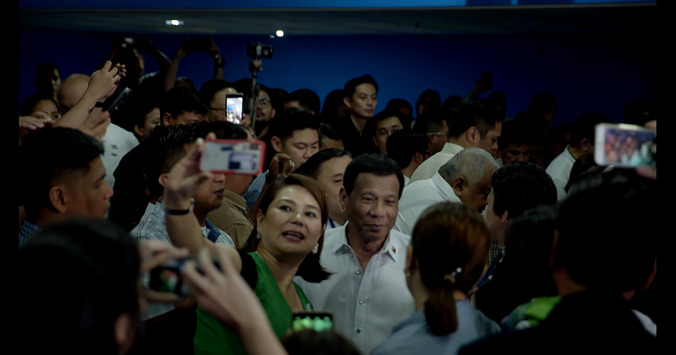The alarming documentary A Thousand Cuts covers attacks on the press in the Philippines

For anyone who cares about the free press, and who wants to get back to a fact-based system of laws and norms, one of the more frustrating developments of recent years has been the appropriation of the term “fake news” by politicians who merely dislike the tone of the mainstream media’s coverage. “Fake news” used to have a real meaning: It referred to deliberate disinformation, spread virally on social media and via unsourced websites designed to look like legitimate journalistic outlets. But these days, anyone in power who doesn’t like it when reporters expose inconvenient details about their campaigns, policies, or personal lives can just say that the press is making everything up, and that their sources are either liars or fictional.
The Ramona S. Diaz documentary A Thousand Cuts covers a group of intrepid Filipino journalists—led by the unshakable Maria Ressa—who for years now have been suffering near-constant harassment and undercutting from the controversial crime-fighting President Rodrigo Duterte and his followers. The framing of those attacks might seem awfully familiar to American viewers. Ressa and her team at the website Rappler have been accused of being unpatriotic for criticizing their country’s extrajudicial killings of Filipino citizens. They’ve been called “presstitutes,” who only publish negative stories because they’re being paid by the enemies of the state. When provoked, Duterte’s army of online defenders suggest possible solutions to his Rappler problem, such as: arrest the journalists, bomb their offices, and rape Ressa. It’s all become disturbingly ugly.
Diaz started shooting A Thousand Cuts in 2018, and the last scene in the film was added about a month ago (with everyone wearing masks to slow the spread of COVID-19). During that time, Diaz witnessed an alarming escalation in Duterte’s war against the press, as Rappler’s reporters found themselves implicated in what government officials described as a “matrix of coup-plotters,” performing acts of overt treason. A Thousand Cuts follows Ressa as she travels to the U.S. for conferences on press freedom, getting feted by the likes of Amal and George Clooney, then shows her returning to the Philippines and getting arrested at the airport.
A Thousand Cuts can be a little scattered in its storytelling. There’s an underdeveloped subplot about Rappler’s coverage of a local election where a Duterte disciple is facing off against a reformist. And Diaz can’t seem to resist including lengthy clips of Duterte’s earthy, rabble-rousing speeches, where he rails against the drug trade and boasts about his sexual virility. The movie is loaded with moments meant to generate shock and outrage, but it could use more shoe-leather procedural scenes, showing in detail how Ressa’s team goes about investigating the police’s abuses of their constitutional authority.
Still, it’s hard to overstate the relevance of what A Thousand Cuts reveals about a democracy sliding into authoritarianism—and what Ressa has to say about the proper ways to push back. Her colleagues make bitterly dark jokes about the last days of a free Filipino press, but she herself remains dogged, determined to exercise her rights and use every legal recourse to keep holding the government accountable, for as long as she’s allowed. “You can’t fight monsters by becoming monsters,” she says, as she keeps showing up to politicians’ press conferences and public forums. Even in rooms filled with Duterte partisans, Ressa calmly and persuasively makes the case that the press serves the people’s interests, even if—and perhaps especially when—it pisses those people off.